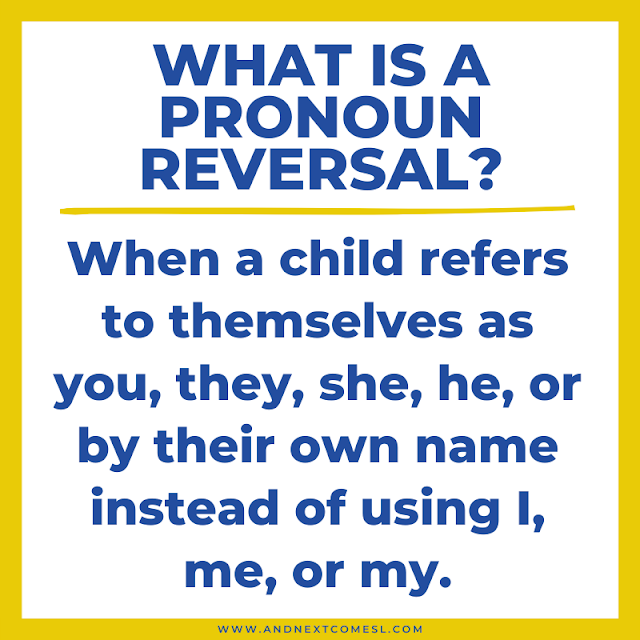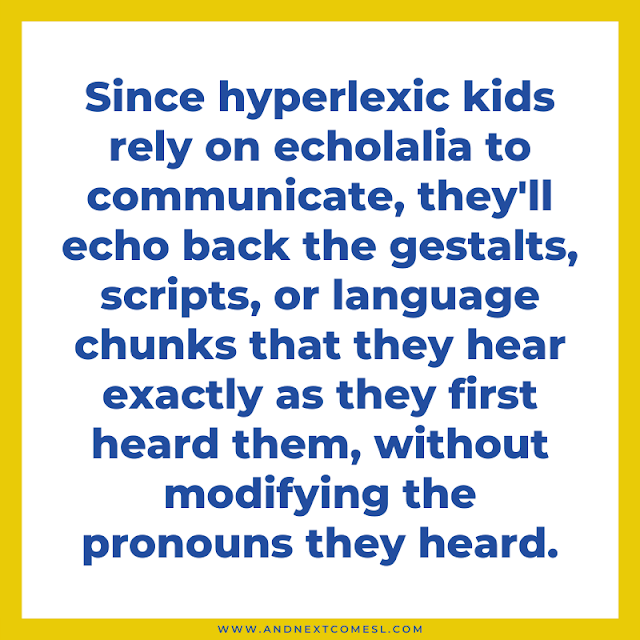If you read through the signs of gestalt language processing or even these lesser known characteristics of hyperlexic learners, you'll see pronoun reversals listed for both.
From time to time, you'll even see threads in hyperlexia support groups asking about why their child has a hard time with pronouns. Or why they always speak in third person.
So what's the deal with these pronoun reversals in hyperlexia?
Is this pronoun thing something to be concerned about? Should you be practicing pronouns with them? Why is it so common? How can you help? Well, that's what we'll be discussing below!
We'll look at why pronoun reversal is common in hyperlexia, the real reason behind why it happens (it might not be what you think!), and what you can do to help.
What is a Pronoun Reversal?
A pronoun reversal is when a child mixes up the pronouns they use when speaking. They might speak in third person as a result. In other words, they may refer to themselves as you, they, she, he, or by their own name instead of using I, me, or my.
For example, instead of saying something like "My turn," they might say "(insert their name)'s turn" or "Your turn" even though they are referring to themselves. For years, my hyperlexic son used to say "J have a turn" whenever he wanted a turn with something instead of "I want a turn." It seemed like he just found personal pronouns confusing, but that's not the case, as you'll soon see.
Now, some degree of mix-ups and confusion with pronoun usage is common in toddlers, but, for some kids, especially those who are autistic, hyperlexic, or gestalt language processors, you might see more pronoun reversals. And there's a good reason why.
Why Pronoun Reversals are Common in Hyperlexic & Autistic Children
These pronoun reversals can be easily explained if we look at the language development of hyperlexic and autistic kids. They often use echolalia and most (if not all!) are gestalt language processors.
Since hyperlexic and autistic kids rely on echolalia to communicate, they'll echo back the gestalts (or scripts or language chunks) that they hear exactly as they first heard them, without modifying the pronouns they heard. So they often say "you" or their name simply because that's the way other people referred to them in the original gestalt or language chunk.
In other words, gestalt processors, including those who are hyperlexic or autistic, will copy "whole expressions without adjusting the pronouns" just like Ann Peters writes in The Units of Language Acquisition. You can grab a copy of this PDF here (scroll down to the bottom).
So really pronoun reversals aren't necessarily cause for concern. As Marge Blanc is quoted with in the Gestalt Language Processing Handbook, "When a kid picks up the entire gestalt, he's got the pronoun of the original speaker. So 'pronoun reversal' is nothing more than that."
But there are a few things you can do that will help hyperlexic learners develop more spontaneous and natural language without as many pronoun reversals. That's what we'll look at next.
How You Can Help Hyperlexic Learners Have Fewer Pronoun Reversals
There are two main strategies that you can use to help with those pronoun reversals. It all has to do with the language you model and how you model it.
One thing you can do is avoid using the pronouns "you" or "your" when speaking to your hyperlexic child. That includes avoiding these pronouns when asking questions as well (easier said than done, I know).
As outlined in Marge Blanc's book, it's "wise to avoid 'you' and 'your.' They are tricky to model and take another person to help you. Without that third person to label as 'you,' we find ourselves inadvertently stepping into the 'pronoun reversal' trap."
So what can you do instead to build better language skills and help with personal pronoun use? Try using "Let's." For example, try "Let's have a snack" instead of "Here's your snack" or "Do you want a snack?" This is where declarative language really comes in handy.
The second strategy is to model from a child's perspective or from a joint perspective. Try to model phrases in a way that reflects how your hyperlexic child could say it if they could. Remember that gestalt learners will "repeat what you say exactly as you say it. You can take advantage of this learning style by saying things 'as he would if he could.'" (source: More Than Words book)
Once you start making these tweaks, you'll definitely notice fewer pronoun reversals.
A Quick Recap on Pronoun Reversals in Hyperlexia
So where you surprised by what the real reason behind pronoun reversals was? Or did you already know? Either way, here's what was discussed above about pronoun reversal in hyperlexia and autism:
- A pronoun reversal is when a child refers to themselves as you, they, she, he, or by their own name instead of using I, me, or my
- Pronoun reversals in hyperlexia and autism can be easily explained by echolalia and gestalt language processing
- Hyperlexic learners are simply repeating back the chunks of language exactly as they first heard them without modifying the pronouns they heard
- You can help a hyperlexic child have fewer pronoun reversals by avoiding the pronouns "you" or "your" when speaking to your child and by modeling language from the child's perspective or from a joint perspective
I truly hope you found this information about pronoun reversal in hyperlexia helpful! If you'd like to learn more about gestalt language processing in depth, I highly recommend checking out the Meaningful Speech courses and handbook. Use coupon code DYAN to save 5% on the handbook or courses.







